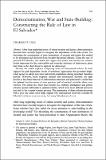| dc.description.abstract |
Using the case of post-war El Salvador, this article first argues that justice and security are tremendously important for the survivability and everyday relevance of democracy, given that crime is the chief threat to support for democracy. Second, the article explores competing views of institutional reform. It finds support for path-dependent ‘mode-of-transition ’ approaches that postulate heightened agency to adopt new rules and reform institutions during uncertain transition periods. However, more skeptical cultural and institutional theorists are right insofar as the formal removal of authoritarian structures and personnel is easier than the informal transformation of state practices and of society’s attitudes about state services. The article also finds that security (i.e., military, intelligence and police) reforms operate differently to judicial reforms, which were more difficult and were less tied to the country’s peace process. The interaction of these reform processes with a post-war crime wave helps explain why international observers consider El Salvador’s reforms a success story, but many Salvadoreans do not. |

